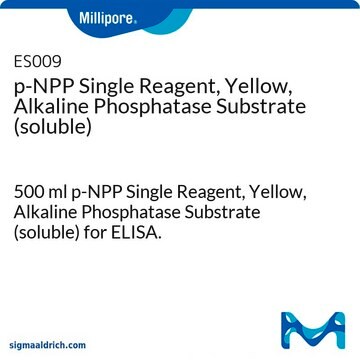487664
p-Nitrophenyl Phosphate Substrate Buffer
This p-Nitrophenyl Phosphate Substrate Buffer is validated for use in ELISA.
Iniciar sesiónpara Ver la Fijación de precios por contrato y de la organización
About This Item
UNSPSC Code:
41116158
NACRES:
NA.77
Productos recomendados
Quality Level
sterility
non-sterile
form
liquid
manufacturer/tradename
Calbiochem®
storage condition
OK to freeze
protect from light
color
clearlight yellow
shipped in
wet ice
storage temp.
2-8°C
Categorías relacionadas
General description
Alkaline phosphatase substrate buffer supplied as ready-to-use. A diluent for Cat. No. 487663.
This p-Nitrophenyl Phosphate Substrate Buffer is validated for use in ELISA.
Application
ELISA (see comments)
Biochem/physiol Actions
Primary Target
Alkaline phosphatase substrate buffer
Alkaline phosphatase substrate buffer
Product does not compete with ATP.
Warning
Toxicity: Standard Handling (A)
Other Notes
Product tested for stability at 4°C, 18-26°C, and 37°C. Product performance is tested on the final product by ELISA.
Suggested procedure for use of p-NPP in alkaline phosphatase-based ELISAs:
1. To 39 parts distilled water add 1 part 50X p-NPP Concentrate (Cat. No. 487663) and 10 parts p-NPP Substrate Buffer. Mix well and store protected from light. This diluted reagent is suitable for up to 10 h after preparation.
2. Complete all required incubations with antibodies and alkaline phosphatase-labeled probes.
3. Wash plate wells at least 4 times with Tris-buffered saline (TBS) containing 0.1% Tween®-20 detergent. DO NOT USE PHOSPHATE BUFFERS; inorganic phosphate is a potent inhibitor of alkaline phosphatase.
4. After the final wash, shake and blot all residual buffer from the wells.
5. Add 100 µl of 1X p-NPP Substrate Solution to each well and incubate for 15-60 min. (If a kinetic study is desired, readings at 405 nm may be taken at intermediate intervals).
[Note: Optimal incubation times may vary depending on the amount of enzyme present. If color develops too quickly, dilution of the probe, antibody, or alkaline phophatase-labeled reagent may be required.]
6. Stop the reaction by adding 100 µl of 1 N NaOH.
7. Read absorbance at 405 nm.
Note: Variations in time, reagent volumes, and temperature may require further standardization by the user.
Suggested procedure for use of p-NPP in alkaline phosphatase-based ELISAs:
1. To 39 parts distilled water add 1 part 50X p-NPP Concentrate (Cat. No. 487663) and 10 parts p-NPP Substrate Buffer. Mix well and store protected from light. This diluted reagent is suitable for up to 10 h after preparation.
2. Complete all required incubations with antibodies and alkaline phosphatase-labeled probes.
3. Wash plate wells at least 4 times with Tris-buffered saline (TBS) containing 0.1% Tween®-20 detergent. DO NOT USE PHOSPHATE BUFFERS; inorganic phosphate is a potent inhibitor of alkaline phosphatase.
4. After the final wash, shake and blot all residual buffer from the wells.
5. Add 100 µl of 1X p-NPP Substrate Solution to each well and incubate for 15-60 min. (If a kinetic study is desired, readings at 405 nm may be taken at intermediate intervals).
[Note: Optimal incubation times may vary depending on the amount of enzyme present. If color develops too quickly, dilution of the probe, antibody, or alkaline phophatase-labeled reagent may be required.]
6. Stop the reaction by adding 100 µl of 1 N NaOH.
7. Read absorbance at 405 nm.
Note: Variations in time, reagent volumes, and temperature may require further standardization by the user.
Legal Information
CALBIOCHEM is a registered trademark of Merck KGaA, Darmstadt, Germany
TWEEN is a registered trademark of Croda International PLC
signalword
Danger
hcodes
Hazard Classifications
Eye Dam. 1 - Repr. 2 - Skin Irrit. 2
Storage Class
12 - Non Combustible Liquids
wgk_germany
WGK 2
flash_point_f
Not applicable
flash_point_c
Not applicable
Certificados de análisis (COA)
Busque Certificados de análisis (COA) introduciendo el número de lote del producto. Los números de lote se encuentran en la etiqueta del producto después de las palabras «Lot» o «Batch»
¿Ya tiene este producto?
Encuentre la documentación para los productos que ha comprado recientemente en la Biblioteca de documentos.
Los clientes también vieron
Nuestro equipo de científicos tiene experiencia en todas las áreas de investigación: Ciencias de la vida, Ciencia de los materiales, Síntesis química, Cromatografía, Analítica y muchas otras.
Póngase en contacto con el Servicio técnico















